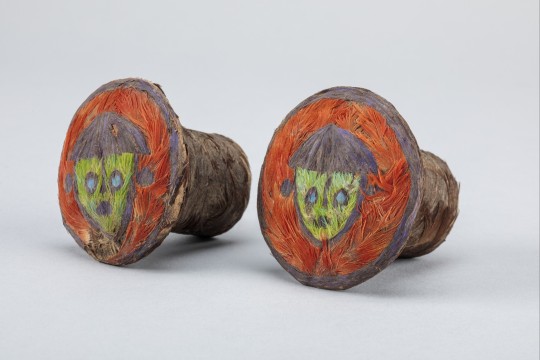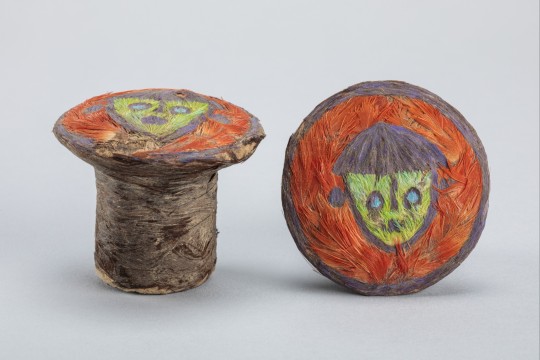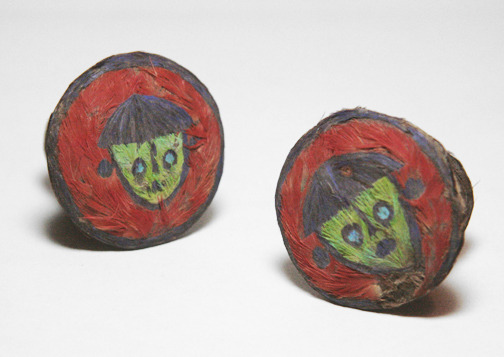#chancay
Explore tagged Tumblr posts
Text


☀ cross stitch of a cat , which is about 1000 years old !
A textile fragment was found in Peru. It belongs to the Chimu or Chancay culture (pre-Columbian era X - XV centuries)
4K notes
·
View notes
Text



~ Pair of Ear Spools.
Date: A.D. 1000-1470
Place of origin: Central Coast, Perú
Culture: Chancay or Inca
Period: Late Intermediate-Late Horizon
Medium: Feathers, adhesive, gourd, and leather.
#history#museum#archeology#archaeology#pre columbian#12th century#15th century#peruvian#peru#south america#pair of ear spools#chancay#inca#indigenous#central coast#horizon period#intermediate period#feathers#a.d. 1000#a.d. 1470
630 notes
·
View notes
Text

human-form jar | c. 1100-1400 CE | chancay style, modern-day peru
in the denver art museum collection
26 notes
·
View notes
Text

Chancay Culture 1000-1470. Feline with cup, Circa. 1200AD, Ceramic,39 x 24 x 25 cm. .
17 notes
·
View notes
Text

Work Basket
Chancay, 1000/1476
In central and southern coastal Peru, archaeologists have unearthed a variety of weaving tools and work baskets. These are often found in women’s burials, which suggests that spinning yarn and weaving textiles were the domain of women. This basket was probably made for a weaver to hold tools used in making textiles, such as needle cases, needles, spindles, and combs.
46 notes
·
View notes
Video
youtube
Un Barco Fantasma en la playa "LA VIÑA" ? / Enigma en Chancay 2024 😨
14 notes
·
View notes
Text

Cuchimilco
#ancient art#ancient history#archaeology#pre-columbian#art history#artifacts#inca#south america#chancay#ancient pottery#ancient figure#ancient artifact#cuchimilco
4 notes
·
View notes
Text

3 notes
·
View notes
Text
🚑 𝗔𝗺𝗯𝘂𝗹𝗮𝗻𝗰𝗶𝗮𝘀 𝗲𝗻 𝗖𝗵𝗮𝗻𝗰𝗮𝘆
✅ Sérvicio de Ambulancias en Chancay
✅ Traslado de pacientes en Ambulancias
✅ Ambulancias para eventos en Chancay
☎️ 𝗖𝗼𝗻𝘁𝗮𝗰𝘁𝗼: 925729541 / 999266732
📲 𝗪𝗵𝗮𝘁𝘀𝗔𝗽𝗽: 980 508 172
#ServicioDeAmbulancias #trasladosenambulancia #AmbulanciasParaEventos #chancay #ambulanciasenchancay



0 notes
Text
COSCO Shipping: La Estrategia Marítima Global de China que redefine el Puerto de Chancay en Perú.
Rodolfo Ponce V, Consultor y Analista Internacional y Geopolítico. Desde la mirada estratégica el análisis debe ser exhaustivo y para eso es importante destacar objetivamente que es la naviera estatal china COSCO Shipping Company. Funciona como una empresa privada, pero pertenece al estado de la republica popular china y como tal es usada para la proyección de objetivos, intereses y necesidades…

View On WordPress
0 notes
Text

Female Figure
Chancay
12th–14th century
After the influence of Wari waned, several ceramic styles evolved on the Pacific coast that emphasized mass production and the fabricating use of molds and stamps. In the valleys north of Lima, the Chancay people produced ceramics that are very distinctive in form and decoration. Painted predominantly in dark brown-black on white, the ceramics appear sloppy by comparison with many earlier and contemporary styles. However, the spontaneity of the decoration, the restrained color scheme, and the often bold painting lend the Chancay wares considerable charm. In addition to vessels, Chancay potters produced ceramic sculptures of humans and animals. Human figures, often made in explicitly male-female pairs, originally must have worn clothing. These two could have been made in the same basic mold with specific anatomical and decorative details added by hand. Both figures wear the same round ear ornaments—those of the female are bigger—but different headdresses. The corner-pointed hat worn by the male figure implies Wari influence since such hats were typical of Wari costume. The function of the sculptures in ancient times is not known. Perhaps they were placed in tombs as companions or guardians of the dead.
source
2 notes
·
View notes
Video
youtube
El Castillo de Chancay este 2024 l ¡Asombroso encuentro con un dragón d...
2 notes
·
View notes
Text

#ancient art#ancient history#archaeology#pre-columbian#art history#artifacts#inca#aztec#mayan#south america#mesoamerica#pre columbian artifacts#pre columbian#chancay#culture#moche culture
2 notes
·
View notes
Text
Puerto de Chancay megaobra que consolida al Perú como un centro logístico, tecnológico e industrial de clase mundial
ECL. Hoy 14 de noviembre la Presidenta de la República, Dina Ercilia Boluarte Zegarra, y su homólogo de China, Xi Jinping, inauguraron hoy el puerto de Chancay, megaobra que consolidará al Perú como un centro logístico, tecnológico e industrial de clase mundial, y lo proyectará de manera estratégica en la región Asia Pacífico. “Chancay, junto al aeropuerto Jorge Chávez, el puerto del Callao,…
0 notes
Text
CHANCAY: EL NUEVO GIGANTE COMERCIAL DEL PACÍFICO.
youtube
View On WordPress
#AsiaLatinoamérica#AutonomíaPortuaria#Chancay#ComercioInternacional#DesarrolloPortuario#InversiónChina#LogísticaGlobal#PuertoDelPacífico#RutasComerciales#Sudamérica#TecnologíaModerna#XiJinping#infraestructura#Youtube
0 notes






